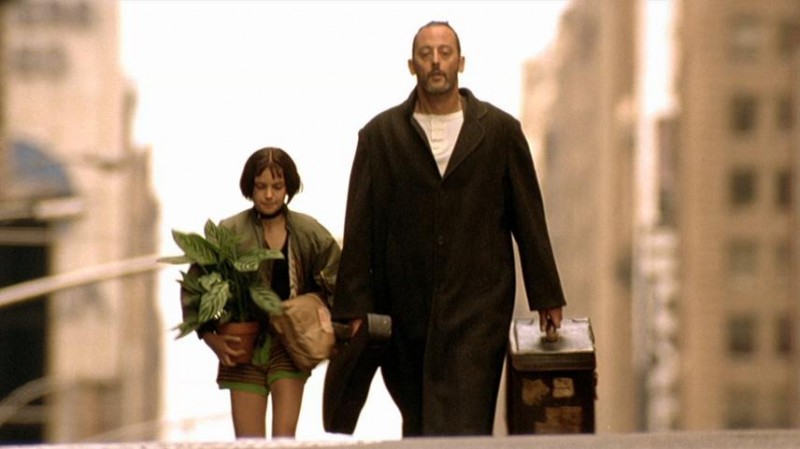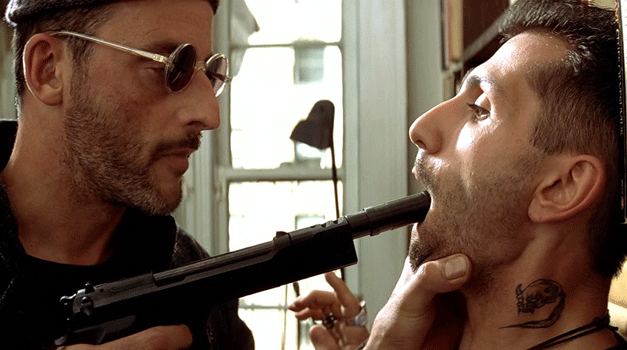Leon: The Professional - A Timeless Exploration of Redemption, Humanity, and Mentorship
 Introduction: "Leon: The Professional," directed by Luc Besson, stands as a cinematic masterpiece that transcends genre boundaries to deliver a poignant exploration of redemption, humanity, and the transformative power of love. Released in 1994, the film continues to captivate audiences with its compelling characters, gripping storyline, and breathtaking visuals. Through the lens of its enigmatic protagonist, Léon, and his unlikely bond with the young Mathilda, "Leon" delves into the depths of morality, mentorship, and the complexities of human connection.
Introduction: "Leon: The Professional," directed by Luc Besson, stands as a cinematic masterpiece that transcends genre boundaries to deliver a poignant exploration of redemption, humanity, and the transformative power of love. Released in 1994, the film continues to captivate audiences with its compelling characters, gripping storyline, and breathtaking visuals. Through the lens of its enigmatic protagonist, Léon, and his unlikely bond with the young Mathilda, "Leon" delves into the depths of morality, mentorship, and the complexities of human connection.
Character Analysis:  At the heart of "Leon" lies its compelling characters, each imbued with depth, complexity, and emotional resonance. Léon, portrayed with stoic intensity by Jean Reno, emerges as a multifaceted protagonist whose profession as a hitman belies a profound sense of morality and compassion. Despite his solitary existence and emotionally detached demeanor, Léon's interactions with Mathilda reveal a vulnerability and humanity that defy his hardened exterior. Natalie Portman delivers a breakthrough performance as Mathilda, capturing the character's blend of innocence, resilience, and determination. Through her relationship with Léon, Mathilda undergoes a profound transformation, evolving from a traumatized young girl into a formidable apprentice and surrogate daughter figure.
At the heart of "Leon" lies its compelling characters, each imbued with depth, complexity, and emotional resonance. Léon, portrayed with stoic intensity by Jean Reno, emerges as a multifaceted protagonist whose profession as a hitman belies a profound sense of morality and compassion. Despite his solitary existence and emotionally detached demeanor, Léon's interactions with Mathilda reveal a vulnerability and humanity that defy his hardened exterior. Natalie Portman delivers a breakthrough performance as Mathilda, capturing the character's blend of innocence, resilience, and determination. Through her relationship with Léon, Mathilda undergoes a profound transformation, evolving from a traumatized young girl into a formidable apprentice and surrogate daughter figure.
Plot Summary: The narrative of "Leon" unfolds against the gritty backdrop of New York City, where Léon leads a meticulously regimented life as a skilled hitman. His world is irrevocably altered when Mathilda, a young girl living in the same apartment building, seeks refuge with him after her family is brutally murdered by corrupt DEA agents. Initially reluctant to get involved, Léon reluctantly takes Mathilda under his wing, teaching her the tricks of his trade while forming an unlikely bond with her. As Mathilda seeks revenge against those responsible for her family's death, Léon grapples with his own moral code and the consequences of his violent profession. Their journey is fraught with danger, as they navigate the treacherous underworld of crime and corruption while forging a deep and enduring connection. Themes: "Leon" explores a myriad of themes that resonate on both a personal and universal level. At its core, the film delves into the nature of redemption and the possibility of finding salvation in unexpected places. Through Léon's relationship with Mathilda, the film examines the transformative power of love and compassion, as both characters find solace and purpose in each other's company. Additionally, "Leon" explores the complexities of mentorship and the responsibilities that come with guiding another individual through life's challenges. The film also confronts themes of morality and the inherent contradictions within human nature, as Léon grapples with the ethical implications of his actions while navigating a morally ambiguous world.
Themes: "Leon" explores a myriad of themes that resonate on both a personal and universal level. At its core, the film delves into the nature of redemption and the possibility of finding salvation in unexpected places. Through Léon's relationship with Mathilda, the film examines the transformative power of love and compassion, as both characters find solace and purpose in each other's company. Additionally, "Leon" explores the complexities of mentorship and the responsibilities that come with guiding another individual through life's challenges. The film also confronts themes of morality and the inherent contradictions within human nature, as Léon grapples with the ethical implications of his actions while navigating a morally ambiguous world.
Cinematography and Visual Elements:  Visually, "Leon" is a stunning cinematic achievement, with Luc Besson's direction imbuing the film with a palpable sense of atmosphere and tension. The gritty urban landscape of New York City serves as a fitting backdrop for the characters' harrowing journey, while the film's stylish cinematography and dynamic action sequences keep viewers on the edge of their seats. From the frenetic energy of the film's adrenaline-fueled action sequences to the quiet intimacy of its character-driven moments, "Leon" expertly utilizes visual storytelling to immerse viewers in its richly realized world.
Visually, "Leon" is a stunning cinematic achievement, with Luc Besson's direction imbuing the film with a palpable sense of atmosphere and tension. The gritty urban landscape of New York City serves as a fitting backdrop for the characters' harrowing journey, while the film's stylish cinematography and dynamic action sequences keep viewers on the edge of their seats. From the frenetic energy of the film's adrenaline-fueled action sequences to the quiet intimacy of its character-driven moments, "Leon" expertly utilizes visual storytelling to immerse viewers in its richly realized world. Sound Design and Music: Éric Serra's haunting score adds to the film's emotional depth, underscoring its themes of loss, redemption, and the enduring power of human connection. The evocative soundtrack enhances the emotional resonance of key moments, from the heart-pounding intensity of the film's action sequences to the poignant intimacy of its quieter, more introspective scenes. Additional
Sound Design and Music: Éric Serra's haunting score adds to the film's emotional depth, underscoring its themes of loss, redemption, and the enduring power of human connection. The evocative soundtrack enhances the emotional resonance of key moments, from the heart-pounding intensity of the film's action sequences to the poignant intimacy of its quieter, more introspective scenes. Additional
Impact and Reception: "Leon: The Professional" received critical acclaim upon its release, praised for its compelling characters, stylish direction, and emotionally resonant storyline. The film's powerful performances, particularly those of Jean Reno and Natalie Portman, garnered widespread acclaim, with both actors receiving praise for their nuanced portrayals. Despite its dark subject matter and morally ambiguous protagonist, "Leon" struck a chord with audiences around the world, earning a devoted following and solidifying its status as a cult classic. Over the years, the film has continued to resonate with viewers, inspiring countless tributes, homages, and discussions among cinephiles and casual moviegoers alike. In addition to its exploration of redemption, humanity, and mentorship, "Leon: The Professional" also confronts themes of loneliness, belonging, and the search for familial connection. Léon, as a character, epitomizes isolation, living a solitary existence defined by his profession and devoid of meaningful relationships. His interactions with Mathilda, therefore, provide him with a newfound sense of purpose and companionship, challenging his perceptions of himself and the world around him.
In addition to its exploration of redemption, humanity, and mentorship, "Leon: The Professional" also confronts themes of loneliness, belonging, and the search for familial connection. Léon, as a character, epitomizes isolation, living a solitary existence defined by his profession and devoid of meaningful relationships. His interactions with Mathilda, therefore, provide him with a newfound sense of purpose and companionship, challenging his perceptions of himself and the world around him.
Mathilda, on the other hand, grapples with her own sense of displacement and loss following the murder of her family. Estranged from her parents and ostracized by society, she finds solace and belonging in her relationship with Léon. Through their shared experiences and mutual dependence, both characters find a sense of belonging and acceptance that had previously eluded them. The film's exploration of mentorship is particularly poignant, as Léon assumes the role of Mathilda's protector and guide in a world fraught with danger and uncertainty. Despite his reservations and the inherent risks involved, Léon takes it upon himself to teach Mathilda the skills necessary for survival, imparting valuable lessons about life, morality, and the consequences of one's actions. In turn, Mathilda's presence challenges Léon to confront his own demons and reevaluate his place in the world, ultimately leading to a profound transformation for both characters.
The film's exploration of mentorship is particularly poignant, as Léon assumes the role of Mathilda's protector and guide in a world fraught with danger and uncertainty. Despite his reservations and the inherent risks involved, Léon takes it upon himself to teach Mathilda the skills necessary for survival, imparting valuable lessons about life, morality, and the consequences of one's actions. In turn, Mathilda's presence challenges Léon to confront his own demons and reevaluate his place in the world, ultimately leading to a profound transformation for both characters.
"Leon: The Professional" also serves as a commentary on the cyclical nature of violence and the perpetuation of trauma across generations. Mathilda's desire for vengeance stems from the traumatic loss of her family, setting her on a path of retribution that threatens to consume her. Similarly, Léon's own experiences as a child soldier have left him scarred and emotionally detached, perpetuating a cycle of violence that he struggles to break free from. Through their relationship, both characters confront the legacy of their pasts and grapple with the possibility of forging a new future untainted by violence and loss. In conclusion, "Leon: The Professional" is a timeless masterpiece that continues to resonate with audiences for its poignant exploration of redemption, humanity, and the transformative power of love. Through its compelling characters, gripping storyline, and breathtaking visuals, the film offers a profound meditation on the complexities of the human condition and the enduring quest for meaning and connection in a world fraught with turmoil and uncertainty. As Léon and Mathilda's journey unfolds onscreen, audiences are reminded of the profound impact that kindness, compassion, and empathy can have in the face of adversity, reaffirming the enduring power of hope and resilience in the darkest of times.
In conclusion, "Leon: The Professional" is a timeless masterpiece that continues to resonate with audiences for its poignant exploration of redemption, humanity, and the transformative power of love. Through its compelling characters, gripping storyline, and breathtaking visuals, the film offers a profound meditation on the complexities of the human condition and the enduring quest for meaning and connection in a world fraught with turmoil and uncertainty. As Léon and Mathilda's journey unfolds onscreen, audiences are reminded of the profound impact that kindness, compassion, and empathy can have in the face of adversity, reaffirming the enduring power of hope and resilience in the darkest of times.


















































